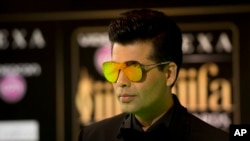India's glitziest film festival opened this week to fanfare and fury, as Indians protested the inclusion of Pakistani artists.
With a ceremony in Mumbai's iconic and newly refurbished Royal Opera House, the celebration of Bollywood and international film kicked off Thursday amid the sober announcement that at least one screening was canceled.
The Pakistani classic "Jago Hua Savera," or "Awake, It's Dawn," was dropped from the Mumbai Film Festival schedule after a local organization claimed it would cause public outrage.
Even a public plea from Bollywood filmmaker Karan Johar could not stem the calm. Johar released a video message asking Hindu nationalist protesters to not disrupt the Oct. 28 release of his big-budget romantic drama "Ae Dil Hai Mushkil," or "Difficulties of the Heart," which features Pakistani actor Fawad Khan in a small role.
"I beseech you to know one thing, that over 300 Indian people in my crew have put their blood, sweat and tears into my film," he said. "I don't think it's fair to them to face any kind of turbulence." Johar pledged to avoid using Pakistani actors or crewmen in future movies.
Tensions between Pakistan and India escalated last month after a deadly rebel attack on an Indian military base. India blamed Islamabad for backing the separatist rebels and providing them with training and arms. Pakistan denied the allegation, saying it offers only moral support to the rebels fighting for Kashmir's independence or merger with Pakistan.
As the two governments trade increasingly acrimonious barbs, people in both film-crazy countries have moved to boycott each other's films.
Pakistani cinema's stopped showing Bollywood fare in their theaters weeks ago. And a blanket ban against showing Indian content on Pakistani television networks and radio stations took effect Friday. India's government has not issued a blanket ban but said it would make such decisions on a case-by-case basis.
The Mumbai festival organizers this week said they dropped the Pakistani black-and-white classic "Awake" due to "the current situation." Meanwhile, the regional political party Maharashtra Navnirman Samiti threatened to disturb any attempts to screen any film involving Pakistani talent.
Many of the Bollywood glitterati attending the festival criticized the outrage and said protests were not the solution.
"Of course you have to stand by the nation, but when it comes to a movie ... there are so many Indian actors who have already put their blood and sweat into it, I think they ( protesters ) should think about it," Bollywood actor Riteish Deshmukh said.
Film director Zoya Akhtar called out the hypocrisy of protesters shutting down films while ignoring the ongoing cricket matches involving teams from both countries.
Bollywood superstar Aamir Khan also said the ruckus was "unnecessary," and that film audiences should be free to decide what they want to see.
"People will see the film and decide for themselves, thank you very much," Khan told reporters.
Prime Minister Narendra Modi's political party along with state authorities in Maharashtra, of which Mumbai is the capital, have issued statements assuring that violent protests would not be tolerated.
Meanwhile, the weeklong film fest was screening some 175 films, documentaries and short films from more than 50 countries at venues across west-coast city.
The lineup included Cannes' prize winner, the British drama "I, Daniel Blake," as well as other international films including Oliver Assayas' "Personal Shopper," Romanian filmmaker Cristian Mungiu's family drama "Graduation," and Pablo Larraín's "Neruda" about the life of the Chilean poet.




